 Petzlover
Petzlover Bordoodle is originated from United States but Irish Setter is originated from Ireland. Bordoodle may grow 16 cm / 6 inches shorter than Irish Setter. Bordoodle may weigh 7 kg / 15 pounds lesser than Irish Setter. Both Bordoodle and Irish Setter has same life span. Bordoodle may have less litter size than Irish Setter. Bordoodle requires Low Maintenance. But Irish Setter requires Moderate Maintenance
Bordoodle is originated from United States but Irish Setter is originated from Ireland. Bordoodle may grow 16 cm / 6 inches shorter than Irish Setter. Bordoodle may weigh 7 kg / 15 pounds lesser than Irish Setter. Both Bordoodle and Irish Setter has same life span. Bordoodle may have less litter size than Irish Setter. Bordoodle requires Low Maintenance. But Irish Setter requires Moderate Maintenance
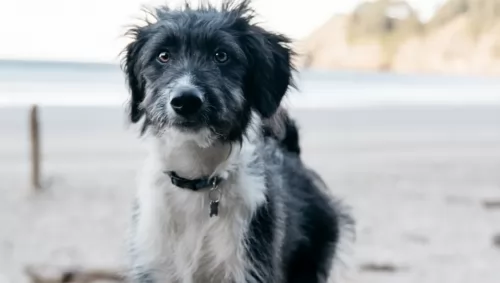 Known also as a Borderpoo or Borderdoodle, the Bordoodle is a designer- or hybrid breed which hails from the United States of America.
Known also as a Borderpoo or Borderdoodle, the Bordoodle is a designer- or hybrid breed which hails from the United States of America.
Both the dogs used in the development of this cross-breed are the Poodle and the Border Collie, and both these dog breeds have their own lengthy histories.
The history of the Bordoodle is short, as it is a modern crossbreed which has been purposefully bred by breeders to bring about a dog with certain looks and temperament.
 The Irish Setter is a gun dog, originating in Ireland and recognized by his beautiful red or mahogany coat.
The Irish Setter is a gun dog, originating in Ireland and recognized by his beautiful red or mahogany coat.
Descending from the Setter group, the Irish Setter, also known as the Red Setter, has a solid pedigree. It was in the 1800s that they were brought to the United States.
The Irish Setter wasn't always what it looks like today and in fact the solid red color was created because of selective breeding practices. The Irish Setter has long medium length floppy ears, brown eyes and he is deep chested.
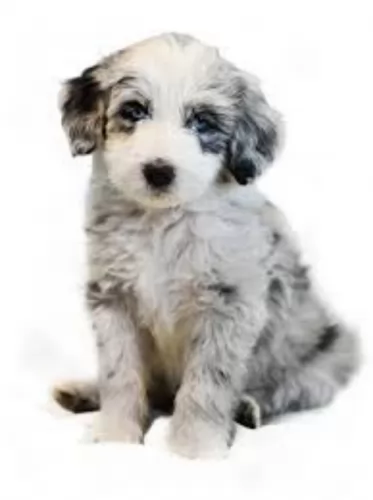 The Bordoodle isn’t a purebred dog but is a cross between a Poodle and a Border Collie.
The Bordoodle isn’t a purebred dog but is a cross between a Poodle and a Border Collie.
He has a soft, medium length coat which is inclined to be wavy. Colors are essentially black and white but chocolate, cream, fawn, merle and grey are also seen.
He is a medium sized dog standing at between 38cm and 55cm and weighing between 13kg and 27kg. The long tail is feathery, the ears floppy or semi-erect and the brown eyes are bright and intelligent. The muzzle is medium to long.
As with any mixed breed dog, the Bordoodle can take after either parent dog but generally the Borderdoodle will be a medium sized dog.
With the Bordoodle you can expect nothing less than a highly intelligent dog. That is because both the Poodle and the Border Collie are super intelligent dogs so the Bordoodle is guaranteed to have got a good portion of this intelligence from both breeds.
It makes training and socialization easy for the dog. It is important for your Bordoodle to be trained and socialized if you want him to be obedient and relaxed around strangers and other pets. As it is, his amicable nature makes the hybrid dog of yours a great family pet – getting on well with other pets in the home as well as with children.
Apart from being such a smart dog, the Bordoodle is active, playful, loving and devoted – everything a serious dog owner wants in a pet. This is a dog that doesn’t really know the meaning of the word aggressive.
 The Irish Setter is a large dog, beautiful and elegant looking, standing at 61 to 71cm in height and weighing anything from 25 to 34kg, males and females.
The Irish Setter is a large dog, beautiful and elegant looking, standing at 61 to 71cm in height and weighing anything from 25 to 34kg, males and females.
The coat is a rich red color and is short to medium length but feathers in places such as the tail, the chest and abdomen, the legs and the tail. The head is long and lean, the ears are long and silky and the tail long and feathery.
The Irish Setter is a playful, friendly, sweet, mischievous, high energy dog who makes a superb family pet, getting on well with children in the home.
It was noticed that in about 1845, Setters in Ireland were mostly red, red and white or even a mustardy-lemon type of color, but there was preference for the solid red coloring. The breed standard for the modern Irish Setter was drawn up in Dublin by the Irish Red Setter Club and approved in 1886.
The dog was essentially bred for hunting game birds, using their excellent sense of smell to locate the bird. He is an alert, intelligent dog and will learn easily. Training and socialization will make him obedient and relaxed.
He isn't an assertive kind of breed and therefore isn't going to make the best of watchdogs. They've got such amicable, kind temperaments that they make popular therapy dogs.
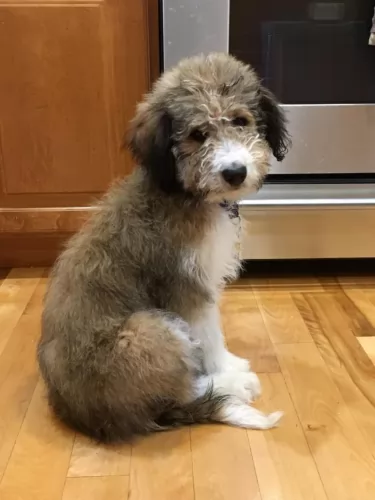 Bordoodles have two great dog breeds to thank for the way they turn out. When you think of the Border Collie and Poodle, you know you’re going to get a dog that is friendly, social, playful, loving and devoted – the ideal family pet.
Bordoodles have two great dog breeds to thank for the way they turn out. When you think of the Border Collie and Poodle, you know you’re going to get a dog that is friendly, social, playful, loving and devoted – the ideal family pet.
Intelligent, he is easy to train too, and with excellent care, you’re going to have a most wonderful family pet and companion, full of fun and life.
 Irish Setters are going to make you a wonderful pet. He has a friendly, confident disposition that makes them ideal pets for families with children who have been taught how to respect- and be kind to animals.
Irish Setters are going to make you a wonderful pet. He has a friendly, confident disposition that makes them ideal pets for families with children who have been taught how to respect- and be kind to animals.
He is a big dog, but with training and socialization he becomes well behaved and obedient. Social and outgoing, this is a dog which just loves the companionship of their human family and will require a good deal of exercise too.
Keep him well exercised, feed him good food that promotes health, give him a nice warm, dry place to sleep and he’ll fit perfectly well into your family and make a splendid pet.
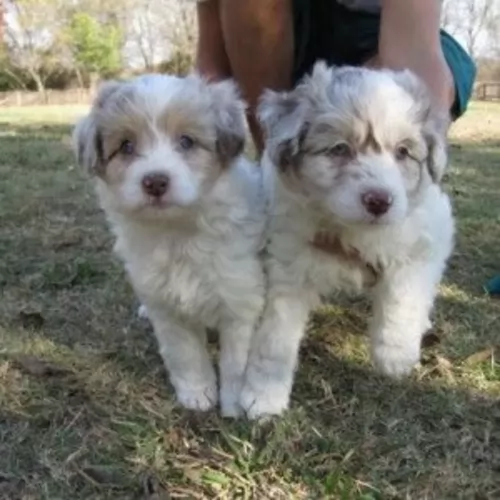 Bordoodles, when well cared for, can live to be 12-15 years of age. There aren’t going to be many health issues to contend with with your Bordoodle as there are no known health problems in this robust breed.
Bordoodles, when well cared for, can live to be 12-15 years of age. There aren’t going to be many health issues to contend with with your Bordoodle as there are no known health problems in this robust breed.
Nonetheless there are some common dog illnesses that you need to be aware of such as progressive retinal atrophy, hip dysplasia and hypothyroidism.
With hypothyroidism, the thyroid gland in the neck of your pet produces a hormone known as thyroxine that controls metabolism, but the disease hypothyroidism makes it that the gland doesn’t make enough thyroxine. Signs that your dog has this illness includes a dull coat, inflamed skin and even hair loss.
Get him to the vet immediately who will do blood tests and provide treatment. Mercifully it isn’t something that is life-threatening.
 Irish Setters are quite a healthy breed but they are also prone to getting some of the common dog illnesses such as hip dysplasia, cancer, bloat and canine leukocyte adhesion deficiency.
Irish Setters are quite a healthy breed but they are also prone to getting some of the common dog illnesses such as hip dysplasia, cancer, bloat and canine leukocyte adhesion deficiency.
Known as CLAD, this is a disease of the immune system found in Irish Setters. True, it is a rare disease and affected animals show signs of skin lesions, bone disorders, anorexia and generalized lymphadenopathy.
Irish Setters can develop bloat, a life-threatening condition where the stomach distends with gas and can twist. This is known as gastric torsion and you’ll see your dog’s restlessness. He may even ‘hide away’ somewhere, lying down and drooling, while trying to vomit. This is an illness which requires immediate veterinary intervention.
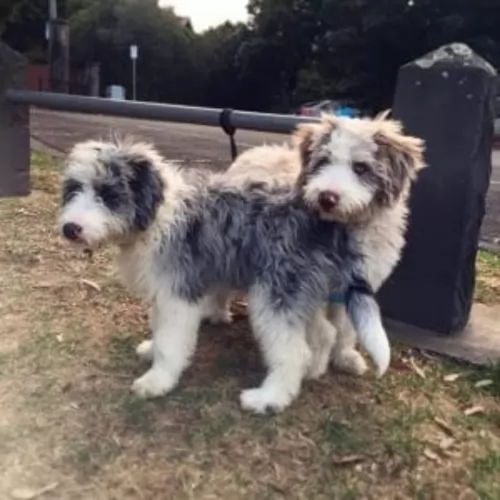 The Bordoodle is a dog which doesn’t shed that much so his grooming requirements are low and he is considered as a hypoallergenic dog.
The Bordoodle is a dog which doesn’t shed that much so his grooming requirements are low and he is considered as a hypoallergenic dog.
He will need to have his coat brushed at least twice a week to keep it shiny, soft and smooth. Depending on how your Bordoodle turns out, he may even require trimming at a professional groomer.
Make time to check his ears inside and out and learn how to clean the inside of his ears to avoid infection and wax build-up.
Dental hygiene is also imperative in dogs, and neglecting to do this will mean food particles and bacteria accumulating along your pet’s gumline, resulting in gingivitis and periodontal disease.
Every dog will require regular exercise and you can get your Bordoodle to join you in your walks. He is the kind of dog that can happily adjust to city or country life, but he will still need to have some ball games and other activities to keep him busy and happy.
He isn’t a dog that can be left alone day after day in the backyard. He is social and playful and loves the companionship of his human family.
If you feed your Bordoodle kibble from some of the top quality commercially produced foods, always research the dog food and take a good look at the ingredients.
The pet food you choose plays an important role in the longevity of your pet. There are commercially manufactured foods that have such poor ingredients that they can actually shorten your pet’s lifespan and cause stress to the kidneys and liver.
If in any doubt about what to feed your Bordoodle, speak to your vet. Cooked brown rice, cooked vegetables and cooked chicken can sometimes be mixed into your pet’s kibble. Raw meat should also occasionally be added in to ward off skin allergies.
 Irish Setters are lean and muscular and an active breed. They love nothing more than to run off in wide open spaces, and if you live in the city and have a large garden, he will need to be taken on long walks. If he is a country dog, he may well run off and be gone for an hour or two before he returns home.
Irish Setters are lean and muscular and an active breed. They love nothing more than to run off in wide open spaces, and if you live in the city and have a large garden, he will need to be taken on long walks. If he is a country dog, he may well run off and be gone for an hour or two before he returns home.
They are dogs which are used to having a job to do such as hunting, so he won't do well if he is put into a small back yard and left to his own device. He is a social dog and wants to be with his human family, relying on them to include him in all their activities.
Your Irish Setters is a lean, muscular, active dog, and to keep him that way he will require a nutritious diet. If you feed him commercially manufactured kibble, make sure it is the very best quality one. It is a good idea to mix in protein such as cooked chicken, brown rice and vegetables. Some raw meat added in from time to time can be very beneficial to him too.
With your beautiful Irish Setter, it is best to avoid feeding your dog processed foods altogether. A good diet is essential for good health. Never leave your dog without a constant supply of cool, fresh water.
The Red Setter’s coat is fairly long on the body but short and smooth on the head. The coat will need to be brushed at least twice a week to prevent matting.
Trim his nails as needed, and find out how to keep his teeth healthy too with vet approved canine dog toothpaste- and brush.
Also check his long, floppy ears because it is so easy for ear infections to develop with these long-eared dogs.